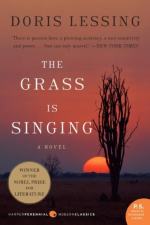|
This section contains 869 words (approx. 3 pages at 400 words per page) |

|
The Grass Is Singing Summary & Study Guide Description
The Grass Is Singing Summary & Study Guide includes comprehensive information and analysis to help you understand the book. This study guide contains the following sections:
This detailed literature summary also contains Related Titles and a Free Quiz on The Grass Is Singing by Doris Lessing.
This novel, written almost entirely in the form of an extended flashback, details the mental, spiritual, financial and marital disintegrations of the lives of Dick and Mary Turner, white farmers struggling to make a living off a sun-baked farm in South Africa. Set in the days of apartheid (institutionalized racism), the novel explores themes relating to the effect of apartheid on the day-to-day lives of individuals both black and white, as well as the slow simmering nature of revenge and an individual's need for self-delusion to avoid facing uncomfortable truths.
The first chapter of the novel describes events and circumstances immediately following the discovery of the body of Mary Turner, stabbed to death on her own veranda. These events include the immediate and painless surrender of her alleged murderer, a black servant named Moses, and the mental disintegration of Mary's husband, Dick. The initial investigation is conducted by a patronizing police inspector called Denham, brought onto the Turner farm by a suspicious but strangely compassionate neighbor named Charlie Slatter. Slatter and Denham both regard the farm's assistant manager, Tony Marston, with a degree of contempt, but are nonetheless intrigued when he says he witnessed circumstances that he says might shed some light on the killing. Denham tells him that unless he has cold, hard facts, he (Denham) isn't interested in hearing anything. Marston feels snubbed, remaining silent as Mary's body and Dick Turner are both taken away.
The life, experiences and feelings of Mary Turner are the focus of the rest of the novel, which is set in the days, weeks, months and years before the murder. The second chapter focuses on Mary's childhood with a father who was abusive and an alcoholic, a troubled mother, and two older siblings who died during childhood. Mary leaves home as soon as she can, eventually obtaining a secretarial job in the city and creating a life for herself that she believes is happy and fulfilled. However, her manner of dress is girlish, her desire for the opposite sex is minimal, and her relationships with her friends are one-sided—they reveal themselves to her but she never reveals herself to anyone.
One day, as the result of a combination of circumstances, she realizes her life isn't as happy as she thinks it is, and becomes obsessed with the idea of getting married. She finds herself drawn to a farmer named Dick Turner, and after a very brief courtship followed by a civil wedding, she joins him on his farm.
Mary soon discovers that marriage is not going to be the life-fulfilling prospect she had imagined. Over the course of time, Dick proves himself to be unfocused and unreliable, the weather is unbearable, and Mary's relations with the black laborers, both in the home and in the fields, prove difficult. Meanwhile, her pride gets in the way of establishing any kind of friendship with her neighbors, particularly Charlie Slatter and his wife, who eventually stop attempting to be friendly. Over the years Mary's spiritual condition steadily and deeply deteriorates, to the point where she makes an attempt to leave the farm and return to her life in the city—only to find that it's moved on without her, and she's no longer welcome there. She has no choice but to return to her marriage.
Shortly after Mary's return, Dick falls ill with malaria. After nursing him out of his fever and while he's regaining his strength, she takes over the running of the farm. Much more organized and far stricter than her husband, Mary soon runs afoul of the much more easy-going natives, going as far as striking one of them with a whip. When Dick is up and about again, she makes an effort to get him to streamline his working methods, but her efforts (and his) fail. Some time later, after several house servants have left as a result of Mary's constant hostility, the field worker that she whipped-a man named Moses—comes into the house to work as a house servant. Mary's fear of blacks in general, and of Moses in particular, makes her act even sharper and more aggressively with him—an aggressiveness that doesn't abate even as he begins to take particular care of her when Dick has another attack of malaria.
Some time later, after Dick has recovered from his second bout with malaria, Charlie Slatter pays a visit to the Turner farm and is shocked to see how run down the farm and its inhabitants are. He's more shocked, however, to see the insolence with which Moses treats Mary and the almost flirtatious intimacy with which Mary responds. Slatter takes matters in hand and bullies Dick into hiring a manager and taking Mary away on a holiday. Slatter even hires the manager, Tony Marston, and Dick and Mary reluctantly make plans to go away. However, on the night before they are to leave, Mary (who has by this point almost completely lost her mind) is murdered by Moses, an act of long simmering revenge for her having struck him. At the conclusion of the novel, Moses settles down to await the arrival of the police ... and his punishment.
Read more from the Study Guide
|
This section contains 869 words (approx. 3 pages at 400 words per page) |

|



